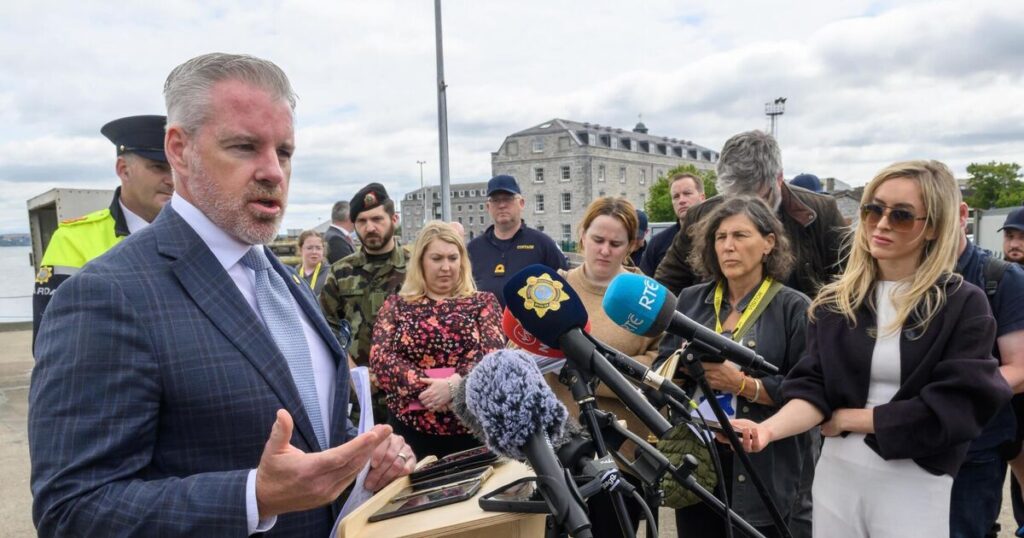Irish cartels are now at the top echelons of organised crime internationally, an Interpol chief has said.
But David Caunter, Interpol director of organised and emerging crime, is optimistic that all leaders of the Kinahan cartel, Ireland’s largest and most deadly crime group, will be “taken down” by law enforcement.
The Kinahan cartel is one of multiple transnational crime groups linked to the foiled MV Matthew drug trafficking operation, during which a €190m bulk cargo vessel was intercepted by Irish authorities at gunpoint while attempting to smuggle some 2.2 tonnes of cocaine with a street value of some €157m through Irish waters.
Eight men were sentenced to a combined 129 years in prison for their role in the drug trafficking operation in the Special Criminal Court yesterday.
Irish organised crime groups are now at the top of organised crime internationally, Mr Cantour said.
And organised crime groups are continuing to expand globally, forging new links and new routes internationally, he said.
Mexico’s Sinaloa cartel remains powerful, despite internal war within the cartel and major government crackdowns on its operations, with the organised crime group continuing to expand internationally, with tentacles now reaching to and deepening within Australia and New Zealand, he said.
“That global connection is quite strong. The local traffickers may not understand that they are just a piece of this transglobal organised crime picture.”
Links are now particularly strong between gangs in the Middle East and South America, he said.
And the MV Matthew case shows these “strong linkages.” The operation was directed from Dubai with Iranian and Hezbollah links, while the cocaine was bought from a Latin American cartel and it was shipped from Venezuela in South America.
On the 26th of September 2023, the MV Matthew was interdicted by the Joint Task Force (JTF) on Drug Interdiction. The JTF consists of the Revenue Customs Service, An Garda Síochána and the Naval Service as the lead representatives for the Defence Forces.
During this operation,… pic.twitter.com/EAGX0xVNkI
— Óglaigh na hÉireann (@defenceforces) July 5, 2025
West Africa is also now becoming more important as a transit route in the cocaine trade, with new groups mushrooming in the region in response to the cocaine trade’s growth there.
“Organised crime groups are beginning to pivot and shift a little bit and moving their products instead of directly into Europe looking for other countries as an intermediary to then conceal that routing back into Europe,” Mr Cantour said.
“These cartels are very resilient. They’re looking for new ways to get their drugs to market.
“We’re seeing Balkan, Lebanese, and other criminal organisations [involvement],” he said.
Ireland also has strong organised crime groups operating domestically but which have major global reach, he said.
The threat of synthetic drugs is now rising in Ireland and globally, he said.
“We’re seeing synthetic drug markets popping up, especially here in Europe, which is an alarming trend just based on the high potential for death, overdose deaths like we’ve seen in North America.”
Fentanyl, nitazines, and other powerful synthetics remain a deadly threat, he said.
But an increase in poly drug cocktails, like pink cocaine – a mixture of various different synthetic drugs – that are gaining popularity, are also an increasing concern for Interpol.
Pink cocaine production is mostly centred in Asia and the Americas currently, he said.
Another new drug of concern is ‘happy water’, another synthetic drug mix, which includes MDMA, methamphetamine, diazepam, and ketamine. It is sold in powder form and dissolved in liquid, creating a psychoactive liquid which has been growing in use in Southeast Asia.
“When organisations are poisoning the streets with those types of substances, there’s a high potential for overdose deaths, for illnesses,” Mr Cantour said.
“Unlike the traditional plant-based drugs [heroin, cocaine], synthetic drug production is not limited geographically.
“It can really happen anywhere in the world, and that’s what makes it quite alarming. You can move your production zone right next to your transportation networks.”
Fentanyl has not yet gripped Europe the way it has the US, but the even more powerful synthetic opioids nitazines have been taking an increasing hold in Europe and are linked to overdoses and death already in Ireland.
Although the Sinaloa cartel manufactures fentanyl and sends it over the border to addicts in the US, Europe does not have the same prescription drug abuse problem as the US so fentanyl has not become as large a phenomenon here, he said.
But it remains “something to watch.”
Heroin use has almost completely disappeared in the US with more powerful – and profitable – synthetics taking its place.
Heroin supply lessoned with the ban on poppy cultivation in Afghanistan but even more powerful synthetics are already taking its place, he said.
“You’ll have various chemicals being shipped from Asia to other parts of the world, and we’re seeing manufacturing pop up in all regions of the world.
“ I’m worried about the synthetic drugs just because of the high potency, the high profitability. It makes it quite lucrative.
“And the harm that those types of drugs can cause, which we’ve seen in North America with the 120,000 overdose deaths.
“And what I have seen with the global drugs business is no country is immune.”
Mr Cantour was speaking to the Irish Examiner at Haulbowline naval base on Saturday after a joint taskforce presentation on the historic MV Matthew drug seizure between gardaí, the navy, and Revenue.
Representatives from Interpol and the Maritime Analysis and Operation Centre – Narcotics (MAOC (N), which targets maritime drug smuggling, were also present as both bodies were also centrally involved in the MV Matthew operation.


